#My citations are all over the place but they're important. Other people's experiences are important.
Explore tagged Tumblr posts
Text
Sukuna's Loneliness Part 1
(Thoughts on Sukuna's Dehumanization as of JJK 261.)
Part 2
Some things to keep in mind...
1) This analysis deals with topics of ableism, racism, and discrimination. (Very brief suicidal ideation mention.)
2) I will be mainly using the TCB scans because of their accessibility.
3) There are a lot of links so you know I'm not making stuff up. The sources are both formal and informal. Please do research on some of the discussed topics to gain a better understanding of them.
(Click pictures for captions/citations.)
The Name Ryomen Sukuna
Before we start this needs to be made clear. Ryomen Sukuna is not a first and last name. Ryomen is a title. Sukuna is a name.
Ryomen uses the kanji 両面 which can be translated as "two-faced".
Sukuna uses the kanji 宿儺 which can be translated as "specter". Individually the kanji can be read as "lodging, inn" (宿, suku) and "exorcism" (儺, na).
Two-faced specter is not a nice name to put it lightly. It's such a mean spirited name that the JP fanbase suspects he was called something else before becoming The Disgraced One.
Normally I would assume his parents did not name him this, however, Sukuna himself had this to say about his birth.

In the original Japanese, Sukuna calls himself 忌み子 (Imigo) which can be translated as "Abominable Child", "Unwanted Child", or "Shunned Child." None of these translations in my opinion get across how severe Imigo is. It's closer to meaning "child who should've never been born". Like the child's very existence is an affront to god. (If you play Elden Ring the Omen are called Imigo in Japanese for this reason.)
You combine this fact with his name and it starts to paint a nasty picture. Sukuna straight up may not have a last name in part from what is implied to be disownment from birth.
Sukuna's Trauma
(Even if he won't acknowledge it as something that has deeply affected him.)
As a Basketball American (aka one of those people with a unique skeletal structure and muscles as Mr. Gojo Satoru would say), I consider myself a professional experiencer of discrimination. This means when a character has likely experienced something similar to me, I can sniff it out like a bloodhound. Though what Sukuna experiences is much closer to ableism than racism. (Discrimination across the board is pretty similar in a lot of ways you know.)
Sukuna is disabled—not as in he lacks an able body (my goodness he is too ablebodied), but as society is not built with any consideration for him. He’s a massive conjoined twin with 4 eyes and 4 arms and 2 mouths. If you know anything about being tall in Japan, it's that it’s a nightmare. Doorways, showers, bathrooms, and buildings are built for small people which leads to the very infrastructure causing problems for anyone big. But Sukuna’s size is just the start of those kinds of problems. He canonically wears women’s kimonos to accommodate his arms since they have larger sleeves. He often goes shirtless or wears a shawl simply because clothing isn’t made for him.


If you’ve known or read anything by people with mobility issues or missing limbs, a major complaint is clothing. For example someone with a missing leg can either pay for expensive customized pants, or they can purchase regular pants and tie off the extra pant leg. They can have trouble buying one shoe since they almost always come in pairs. (To rectify this sometimes they find a mirror twin called a Sole Mate who they share the extra shoe with.)
Now if I’ve learned anything from people with mobility issues, it’s that ablebodied people are really fudging annoying and rude. They will grab mobility aids unprompted and even move people around in wheelchairs without permission. In this treatment, the ablebodied dehumanize the disabled and treat them like objects in their way.
Sukuna also experiences objectification in a similar manner. People see him as an obstacle to conquer, a means to test their strength, a helpless thing that needs curing, a test subject to study, and a symbol for their own use. All of these things are extremely dehumanizing and things disabled people may have to deal with.
We’ve got Yuji and co seeing him as a curse to exorcize.
Kashimo and others using Sukuna to test their strength.
Yorozu seeing Sukuna’s lack of interest in romantic/sexual love as a thing to be cured. (Your honor, he is aroace.)
Kenjaku using Sukuna as a test subject and insurance for The Plan.
Heian era society revering him as a god to use him in rituals for their benefit.
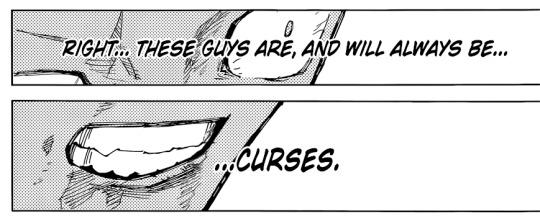
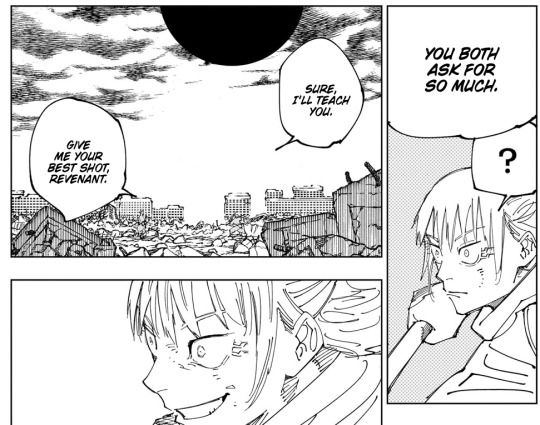



The last example is a very interesting form of discrimination. If you aren’t familiar with the term, there is one called benevolent prejudice. This is when discriminatory beliefs are flattering instead of malicious. (Examples: Black people are athletic, Asian people are smart, etc.)
Benevolent prejudice still results in negative outcomes for the group affected, but to me personally, some of them are kind of hilarious in isolation. Here are some of my favorites:

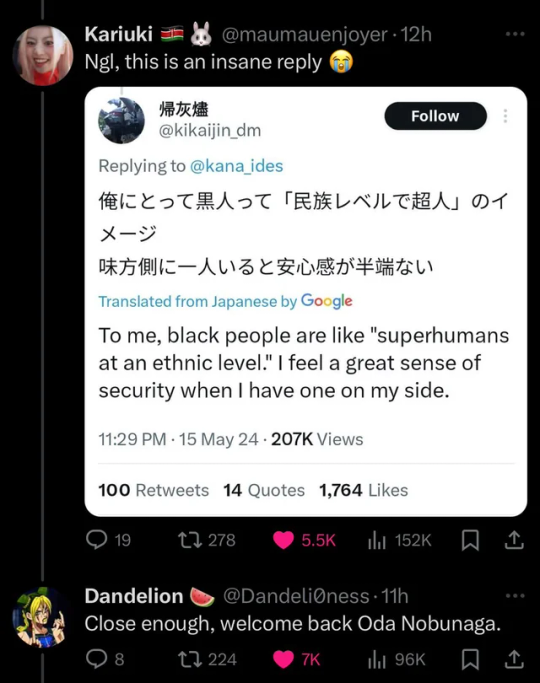

I’m pretty sure this is why Gojo apologizes so readily to Miguel and without resistance. He realizes “oh crap I’m doing to Miguel what everyone does to me”.
And yes this belief had a negative outcome for Miguel—it’s likely the reason Gojo beat him so hard compared to other characters in the JJK 0 movie. (Remember Gege has direct involvement in the anime.) This is canonically a racially motivated beatdown, trauma response from the black ropes mimicking Toji notwithstanding.
On the ableism side of things this benevolent prejudice can manifest as turning people with deformities or atypical features into objects for worship, fetishization, or sacrifice.
As an aside, I suspect Uraume’s gender is ambiguous because they’re intersex. And boy howdy do intersex people experience dehumanization as objects of worship (fetishization and religious symbols) or as a problem that needs to be corrected (forced surgical procedures/mutilation and erasure). This, in my opinion, might be the reason Sukuna likes them more than anyone else. Uraume may not fully understand the isolation of strength, but they do get the dehumanizing way in which society treats them both.
My point here is that Sukuna experiences regular prejudice and the benevolent type. All of which are dehumanizing from every single angle, leaving him in a state of near constant objectification. (Uraume puts Sukuna on a pedestal as their master which is emotionally isolating but they still see him as an individual on his own merits.)
What constant systemic discrimination does to a motherfudger...
So now that we've established how Sukuna's dehumanization happened, I can rant about how this is probably a major reason behind his disconnect from his humanity and a source of his loneliness.
Gege has stated that Sukuna and other people don’t really know how to categorize his personhood. He's so strong he's more like a natural disaster than anything else.
Sukuna says things like this about himself.


"If I was a cursed spirit…"
"...that's the sort of human I was."
He doesn’t see himself as a human or a curse. At one point he did consider himself human but stopped. He sees himself as this third thing which is highly likely to be a “living creature” as Gojo would put it.
Gojo also experienced benevolent prejudice that lead to his dehumanization and subsequent objectification (thanks JJK 261 for making me realize it was much worse than I assumed). And from birth too. I think this is why they’re able to connect so well during their fight. Especially since this prejudice leads to them becoming sinks for everyone's burdens while being scorned in the same breath. (It's like how people adore "my kind's" athletic/manual labor abilities but then don't want us in their neighborhoods.) The world isn't made for them but it's going to exploit the very thing it hates them for.
The difference between those two is probably the stares of disgust and day to day inconveniences from the extra parts. Gojo can effectively blend in with other humans if he really tries. Sukuna cannot. (Maybe that’s why he says this too.)

Sukuna to me, feels like a manifestation of this rage against constant systemic discrimination. You look at him funny? He kills you. You treat him like a thing that serves you? He kills you.
I know I'm projecting but hear me out!
I don't think Sukuna was aggressively abused by others for his appearance to get to this point by the way. It's more of a death by 1,000 cuts scenario. Someone crossing the street to avoid you, a flash of revulsion when they look at you, backhanded compliments, name-calling in whispers, gentle reminders you don't belong in infrastructure and accessibility to resources. On their own they feel like paper cuts, but if you experience them constantly without time to recover, one day you look down and realize there's a massive rotting gash.
Thankfully I have friends and spaces where I can exist without being subject to discrimination. I can treat these wounds and keep going relatively ok. When I was a child, I didn't have a proper outlet for that and it ate me alive. I flip flopped between wanting to magically wake up fully white or disappearing entirely and wanting everything to explode. Sometimes I wanted all of these thing at the same time. These old wounds reopen on occasion but I know how to deal with that now.
In Sukuna's behavior and attitude, I see that kind of hurt. And his coping strategy appears to be making everything explode since violence is all he knows. Maybe cannibalism wasn't the healthiest way to deal with this but you know it's Jujutsu Kaisen.
Speaking of cannibalism, the definition of a cannibal is an individual that eats members of their own species. Sukuna is regarded as a non-human by everyone around him in every instance except when he is called a cannibal. He’s not human enough to be a part of society but just human enough to be a cannibal. His status as a human changes in what makes it easiest to disregard him as an individual worthy of respect or consideration. (Think of how conservatives misgender gender non-conforming cis people and then turn around and misgender trans people for hypocritical reasons.)
Sukuna’s acknowledgement of both Jogo and Gojo is bittersweet with this lens. Jogo is a curse fighting on behalf of curses’ humanity. He wants curses to live as humans after being born lowly and unwanted in a world that wants him erased. Gojo is a human forced into godhood by circumstances he couldn’t control. He’s someone who became isolated and rejected by others until he stopped seeing himself as a human. Sukuna has lived both of these experiences and connects with them in a way no one else can.
Unfortunately, because Sukuna only knows how to love through violence, he kills them. (Great job, Sukuna, you did this to yourself. You could've had friends.)
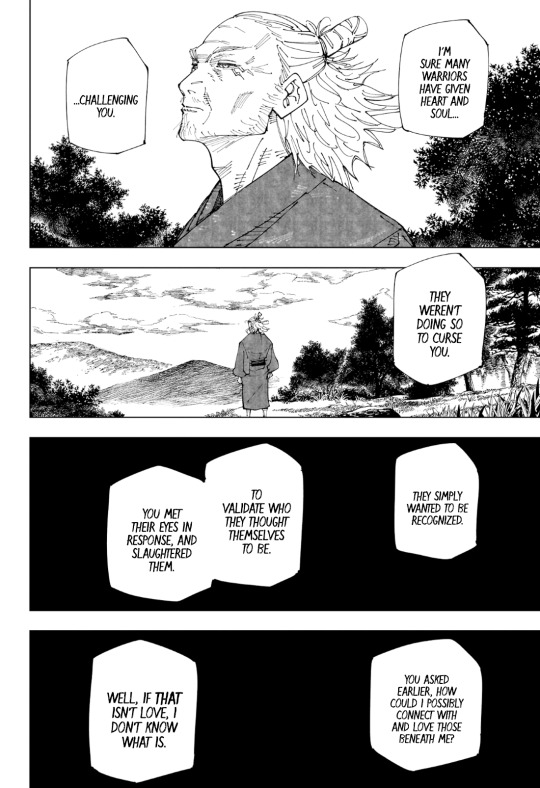
I also suspect this is why Sukuna believes this.

This type of society is one in which Sukuna can exist. He can relentlessly pursue the strength through which he builds his self-esteem and be acknowledged as something. However, that is still isolating. And Sukuna is a human, which means he’s a social creature that needs companionship. (Not necessarily romantic or sexual mind you.)
I find Sukuna’s vague suicidal ideation and refusal to die extremely relatable for all these reasons. Much like Gojo, he seems to be convinced the world will never treat him the way he wants to be treated and wants out.
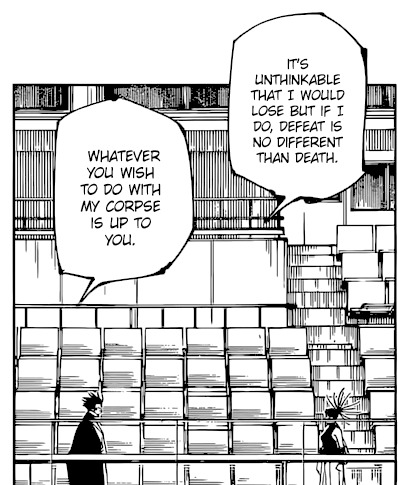

There’s also something to be said about the unique loneliness aromantic and asexual people experience from wanting deep and fulfilling relationships without romance or sex in a world that only values relationships with both of those things.
So why is Sukuna like that?
Despite knowing how much it sucks to be dehumanized, Sukuna still participates in dehumanization himself, referring to humans as insects/animals or things for him to play with.

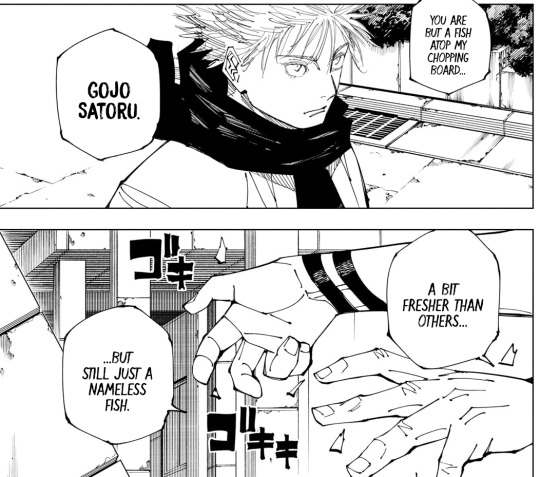

And in a Kenjaku parallel, food for him to enjoy as well.
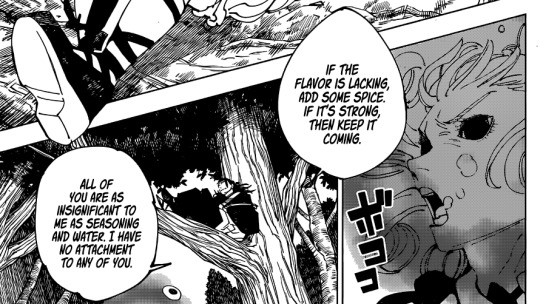

I predict this attitude he has towards humans is the direct result of his dehumanization and objectification for his appearance and strength. It’s all one big unhealthy coping mechanism.
I think this is why Yuji ideologically pisses him off so much. Imagine truly believing all this isolation and suffering for innate characteristics made you stronger, only to find someone who experienced none of that starts rising to your level and shatters your entire world view.



Trauma isn’t something that makes people stronger, but Sukuna likely believes it does as a cope. In my last analysis I called Gojo a sopping-wet pathetic cat who pretends everything is ok. Sukuna is no different if you ask me.
#cactus yaps#Not me realizing I stopped seeing myself as human because of some silly anime boys.#Not Gojo and Sukuna being my faves because of my race related dehumanization. My queerness made the non-human status fun though.#Stay tuned for Part 2 of me bullying Sukuna. He's even more pathetic than I'm letting on and I will get there eventually.#My citations are all over the place but they're important. Other people's experiences are important.#That person who called Sukuna and Gojo twin flames was right.#ryomen sukuna#jujutsu kaisen#jjk spoilers
243 notes
·
View notes
Text
Woke' warriors on San Fran school board deny gay white dad with bi-racial daughter place on volunteer parent committee because he's not diverse ENOUGH!
Seth Brenzel, a gay white father of a bi-racial child, was denied a spot on the San Francisco Board of Education's volunteer parent committee
The issue of whether to allow Brenzel to volunteer for the 15-person parent advisory council was debated for almost two hours on Tuesday night
His candidacy faced opposition from some board members and members of the public who argued that there wasn't enough diversity on the council
Those who opposed his candidacy were concerned with the fact that he is white
The 15-person council currently only has 10 members: Two black mothers, one Asian-American, three Latinx, one Pacific Islander and three white
Brenzel, who is the executive director of a music program for children, is openly gay. He lives in San Francisco with his husband and their young daughter
If approved, Brenzel would have been the only father on the council
The issue of whether to allow Seth Brenzel to volunteer for the 15-person parent advisory council was debated for almost two hours on Tuesday night during a board meeting.
The parent advisory council, who had unanimously supported Brenzel to join their all-female committee, had submitted his name to be approved by the school board.
His candidacy, however, faced opposition from some board members and members of the public who argued that there wasn't enough diversity on the council - even though there are five seats currently empty.
Those who opposed his candidacy were concerned with the fact that he is white.
The 15-person council currently only has 10 members: Two black mothers, one Asian-American, three Latinx, one Pacific Islander and three white.
Brenzel, who is the executive director of a music program for children, is openly gay. He lives in San Francisco with his husband and their young daughter.
If approved, Brenzel would have been the only father on the council.
After the lengthy debate, the school board eventually decided against voting on his appointment at all and asked the council to find alternate candidates for them to consider.
Brenzel's appointment to the council was just one of the agenda items for the meeting that ended up going for seven hours.
Another item on the agenda was about reopening San Francisco schools amid the COVID-19 pandemic.
It is the same school board that last month voted 6-1 to strike the names of George Washington, Thomas Jefferson and Abraham Lincoln from the district's institutions.
As a result, 44 schools had to change their names after board members deemed the historical figures to have ties to racism or have 'dishonorable legacies' despite basing the decision on incorrect Wikipedia articles.
The issue of diversity was a main argument in deciding whether to appoint Brenzel to the council.
One person, only identified as Tara, said during the meeting: 'They are not a diverse group of parents as far as I have seen, I have noticed and have observed.'
Others who opposed Brenzel's appointment argued that the council 'does not even mirror Joe Biden's cabinet' and that other 'voices need to be heard first before white queer voices'.
Commissioner Matt Alexander - who described himself as the lone white board member - had said that it seemed 'like the white members are over-represented on the P.A.C.' and that there was an under-representation of 'Arab, Vietnamese, Native American folks'.
'I'm probably going to get complaints now I'm telling white parents not to be involved or something. I want to be clear, that's not what I'm saying,' he said, before later adding that 'white parents also in the city tend to have a lot of privilege and power and access the board of ed in various ways.'
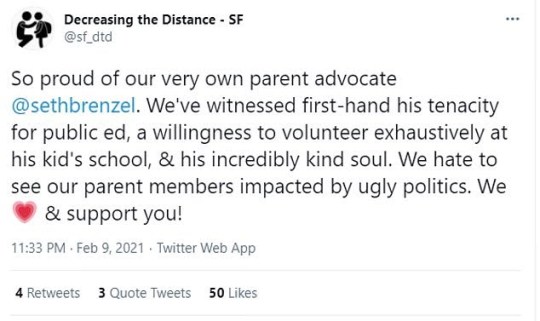
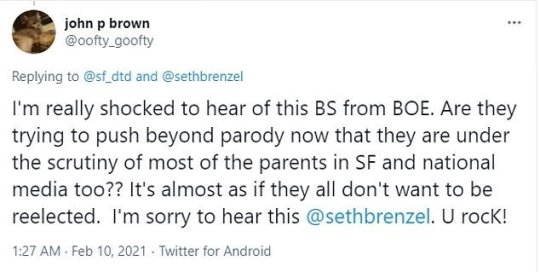
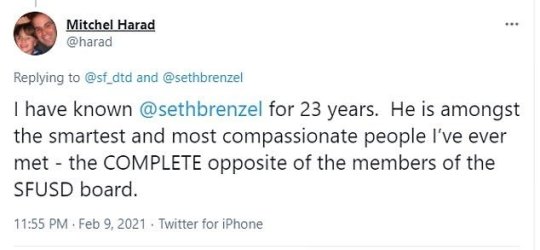
Several others, however, defended Brenzel's candidacy, pointing out that he would bring diversity because he is gay and a father.
'I see no reason why Seth should not be confirmed. I think this is just honestly just a political show so you can say that you stopped a white person from getting on,' one speaker said.
Another member of the public said: 'I'm very upset we are focusing solely on race. Seth would be the only male on the pact. He would be the only LGBTQ member. He has a bi-racial child.
'I mean, this notion of oh, he's just a white person therefore we can't have him, it's absolute nonsense. There's diversity beyond the color of our skin and I think it is important to consider diversity beyond just race and the intersectionalty of parents.
'We are all diverse in our own way and Seth brings a lot of diversity to a pact that has no men and no LGBTQ parents.'
It comes as the school board president Gabriela López, 30, defended last month's decision to rename the 44 schools honoring historical leaders who have since been branded by activists as racist.
San Francisco Unified School District had been criticized for voting by 6-1 last month to change the name of one-third of the city's schools.
Parents and residents became concerned when it emerged that historians had not been consulted by the renaming committee.
Instead, committee members allegedly used references from Wikipedia and other non-scholarly sources to determine which personalities were racist and problematic.
Several of those citations have now been proven to be factually incorrect, including a false claim that American poet James Russell Lowell did not want black people to vote and that Paul Revere's military activities were tied to 'the conquest of the Penobscot Indians'.
Gabriela López, the head of the San Francisco Board of Education, continues to defend the decision claiming in a tense interview with the New Yorker that she doesn't want to 'discredit the work that this group has done' despite their use of inaccurate information.
She claimed that she did not believe the names had been selected in a haphazard way, even after being read a list of the misinformation that was used in some of the decisions.
'No, because I've already shared with you that the people who have contributed to this process are also part of a community that is taking it as seriously as we would want them to,' Lopez argued about the errors made in the research process.
'And they're contributing through diverse perspectives and experiences that are often not included, and that we need to acknowledge.
'What I keep hearing is you're trying to undermine the work that has been done through this process. And I'm moving away from the idea that it was haphazard,' she said in the strained Q&A.
Lopez also pushed back on the complaints that historians were not consulted as part of the process.
Among the names included on the list that had provoked pushback from residents and historians was President Abraham Lincoln.
Lopez said that she did not believe Lincoln was a person she would 'admire or see as a hero'.
'I think that the killing of indigenous peoples and that record is something that is not acknowledged,' she said.
'It's something that people are now learning about, and due to this process. And so, we just have to do the work of that extra learning when we're having these discussions.'
Lopez also claimed that the renaming was only facing criticism because 'people will always have a problem with the discussion of racism', not because of the inaccurate information.
'That is what I know. That is why I'm getting death threats. That is why people aren't open to other possibilities. Because when we have this discussion, that's the outcomes no matter how good it's set up, no matter how open we are,' she said.
'No matter what, people are going to have an issue with that. That is what I know, given my experience. Of course, I'm hearing what you're saying, but I don't think it's going to change the outcome. People are still going to be up in arms when we're doing this.'
Among the other criticism received by the city's board of education was that it had voted on the renaming when there appeared to be no plan in place to bring students back to in-person learning.
'What I cannot understand is why the school board is advancing a plan of all these schools renamed by April when there isn't a plan to have our kids back in the classroom by then,' San Francisco Mayor London Breed had said.
The city of San Francisco has also since sued the board of education and school district claiming they have violated a state law that required districts to adopt a clear plan during the pandemic as it relates to in-person education.
Lopez claimed that it is 'completely false' to say they don't have a plan and accused to the mayor of jumping at 'any opportunity to cause further division'.
242 notes
·
View notes